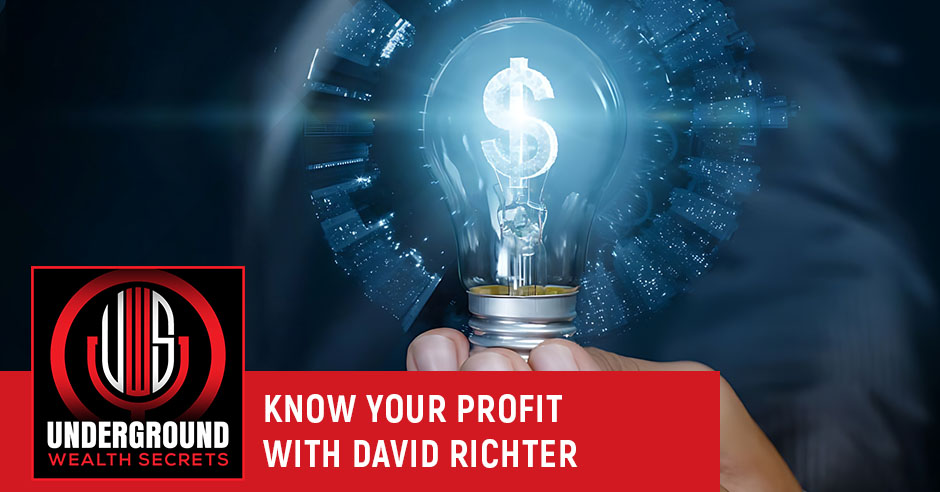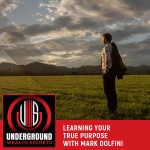Know Your Profit With David Richter
- Post author By rldiamond
- Post date November 25, 2022
- No Comments on Know Your Profit With David Richter

Entrepreneurs and investors start businesses to make money and keep what they earn. So it defeats the purpose when you find you’re losing the money you are making. In this episode, David Richter, a bestselling author and founder of Simple CFO Solutions, highlights the importance of knowing your financial background—because finances uncover the truth of where you’re at in your business. He also explains what keeps most businesses and investors from growing and how best to overcome them. Do you want to be in a good position to capitalize on whatever’s going on in the economy? Tune in to this conversation and know your profit with David Richter!
—
Watch the episode here
Listen to the podcast here
Know Your Profit With David Richter
We have a special guest that I’m very excited to interview. He is a prior investor and owns a company called Simple CFO. He’s a published number-one bestselling author. David, welcome to the show.
Thanks, Julie.
It’s such an honor to have you.
I’m honored to be here. Anytime I can come on and try to bring some value. I love that opportunity. I appreciate you having me on.
It’s such a pleasure. Why don’t you tell me a little bit about your background, what you did before and where you’re at now?
In college, a good friend of mine gave me the book Rich Dad Poor Dad. Life has not been the same since then. That’s when I got excited about real estate investing. I bought a house, fixed it up, rented it and then lease option it later on after I had moved out of there because I lived there for a little bit too. It was a great first deal. I said, “I want to do this more.”
I got hooked up with an investing company that was doing about 5 deals a month, scaled that up to about 25, 30 deals a month and saw everything like wholesale, fix and flip, turnkey, lease options, rentals, subject to deals, land contracts and anything you can imagine there. I did about 800 deals while I was there and then built a small portfolio.
While I was there too, I saw that a ton of investors like to make money but have no idea how to keep it. It’s like, “We could do 25 deals a month.” That sounds great but if you’re spending 26, then what’s the point? That’s why I got to sit in one of the seats, which was the finance seat. I dove in and dug into the finances of the business and had the CPA there teaching me how to read the numbers and how the numbers tell the story.
That’s where I got the knack of being able to read the business finances and what was going on behind the scenes as well too, which leads to what we’re doing and how we’re helping people. That’s how I got started. I got started in the real estate investing world, saw hundreds of deals done and then saw that there was a need for a lot of people to know three simple numbers, what are they making, spending and keeping. That’s a high-level background of my real estate investing journey and getting to see a lot of deals done.
You have a strong real estate background.
At that company too, I was like the utility man. I worked in marketing, sales, acquisitions and selling properties. I was in property management, project management, finance and even transaction coordination a little bit. I got to see how a small business ran like a small real estate investing company. That was another key factor thereof. I could see from the beginning to the end, from marketing to when it’s sold and when the money is deposited, the flow of that whole property and then the cash. That was a good experience. I highly recommend if you’re getting into real estate, it might be good to link up with a company that’s in your area. We’re in the ins and outs trying to bring value to them and see what you have to bring to the table as well. I do have a pretty heavy real estate investing background.
That experience led you to the company that you own.
Yes. I was in the finance seat so we were doing a bunch of deals a month but spending more than what was coming in. It was honestly typical of what we see in real estate investing and a lot of entrepreneurs’ businesses where they run accidental non-profits. They’re trying to make a profit and accidentally not making it, which is very sad.
After five years of being there, I moved across the country with my family, started working with another investor in the Richmond, Virginia area and got to learn more. I learned a lot from him as well too. Also, one of the first things I did was see his books and numbers. I was like, “Numbers tell the story. You don’t. I want to see how it’s going.”
I dove in there. It was a mess like a lot of entrepreneurs. He had someone in there who didn’t know real estate investing. I had to go in there and clean all that stuff up. Three months into it, it was like, “Now he knows what I’m making, spending and keeping on a monthly basis.” We also figured out that he had a lot of his own money tied up in his properties.
It means that he had a small rental portfolio and was leveraged at only 30%. He had 70% equity in his entire portfolio so he was able to refinance and get some money out. That was the power that the numbers gave to him. He said to me at one point there near the end when I was working with him, “This has been life-changing because I now know what I’m making, spending and keeping. I can move and adjust those dials because of the different things that I know. If I spend this much, this is how much it’s going to return.”
Being able to pull the money out too, he hadn’t paid himself like a lot of investors. We opened up an account to pay him. A lot of good things happened there and that was the spark once he said, “This has been life-changing.” I bet this would be life-changing for a lot of other people too if they knew these simple numbers in their business.
That’s what got launched the idea of what we’re doing in Simple CFO. We’re helping the investors not just make the money but keep it as well too. That was the journey from real estate investor to helping the real estate investors keep more of the money and feel like the business is worth it and why they even started their business in the first place.
I’m sure there are a lot of entrepreneurs and investors that are not looking at their financial background as well as they should.
That’s probably 95% to 97% because it’s not the sexy part, let’s be honest here. Most people go to an event and have speaking people on marketing and sales, maybe sometimes on operations, systems and hiring. Most people love the marketing world because that’s more money in the door. That will solve all problems. If you have bad financial habits when you’re small, they don’t get any smaller as you grow.
I love Keith Cunningham and his books. He says in there, “If you scale tumors, cancer grows.” You can’t scale these things. If they’re bad habits, you might have hangups with money or not look at it. They don’t even look at the stuff. That’s why a lot of people wonder. I’m working 80 hours or 100 hours a week whereas I was working 40 hours for someone else. Why don’t I feel like I’m getting ahead? Why do I feel like I’m in my own rat race?
I even mentioned in the book Profit First for Real Estate Investing that a lot of people trade their W-2 jobs and one rat race for a bigger rat race, the real estate rat race. They’re not just living paycheck to paycheck but deal to deal. They’re like, “I need that next deal.” That’s where we see a lot of people that don’t give the finances a second glance usually come to us and say, “Help. What is going on?” Especially if there’s a market downturn.
Up markets cover a lot of sins. You can be like, “I didn’t price or buy it right.” Everything is going up so if we price it a little bit higher, we’ll get that. If you’re in a down market, you have to buy everything right so make sure that you have the right buyers, sellers and everything. If it’s a down market, it uncovers a lot of the sins that you were handling before. Going off on that tangent there, a lot of people don’t look at the numbers or finances.
When that spark triggered in you with that client that you worked with when you moved, how long ago was that and then you started Simple CFO?
That was years ago. That’s been the journey for the past years, helping a lot of people know where they are financially.
What do you think are some of the key things that most of your clients weren’t doing before working with you? What are some maybe top 2 or 3 things that you see or find with a lot of people that you work with?
A lot of people don’t know what they even need from their business. They don’t know what they need to keep. That’s where a lot of people go into it with the business plan of a win and a prayer. “I hope this works. We’re doing deals. There’s money in the bank. It must be working.” There’s no thought of, “How many deals do we need to do to generate this amount of income for us that I can take from the business while we can still grow the business and go to where we want to?”
What we teach a lot of people is what you need to keep from your business. One of the first conversations we have is, “Do you know that number? Do you know what you need to keep?” A lot of people go out to events, masterminds and different things. They hear all these other people doing all these awesome things, especially in America. It’s like, “They’re doing more than us. We got to do more than them.”
We get that type of ego-driven thing like, “I need to do that because of what someone else is doing.” That ends up sabotaging us. There’s a book Crucial Conversations. In Chapter 10, they call it Retaking Your Pen. When you’re born, you’re born with your pen in your hand. That’s your self-worth. You go to school and that’s when you probably start thinking more about what other people care about, what they think and how they act. You start conforming to that because you want to fit in but you’re giving up your pen so they’re writing your story.
You then became an entrepreneur and you’re like, “This is awesome.” You took your pen back and said, “I’m going to give back to the world. I want to provide for my family and do the things that I want to do.” You took your pen back and started writing the story. You then go to a mastermind and then hear that’s what they’re doing so you’re like, “I’m not content. I’m going to do what they’re doing.” You give them your pen so they’re writing your story.
You’re wondering, “Why do I have so much anxiety in my business?” It’s because you’re trying to live someone else’s business and life, instead of sitting down and saying, “This is what I need from my business. This is what I want and I need to make sure my business vision and plan align around this versus what someone else wants for me.” That means you do what you need to do for yourself and your family. That would be mistake number one.
I love you for that because not a lot of people will say the truth like that.
Maybe that’s why the finances aren’t as sexy as everything else. Everything else focuses on the top line like how many leads came in and how much we do in sales. Finances uncover the truth. What we need in our lives is the truth so that way we can know. If it’s not working, we got to change something. If it’s working, say, “How do I turn these dials up to make it work better and do more?”
Finances uncover the truth, and we need the truth in our lives. That way, we can know if it's not working and whether we need to change something. Click To TweetThat’s where the financial portion, I believe, isn’t as easily swallowable as a pill because it usually is a truth pill. “Here’s where you are financially.” That’s why with this whole Profit First message and everything, I’ve tried to make the pill a little bit easier to swallow like, “You don’t have to become this finance expert because there’s a lot of garbage around it too.” A lot of people in the financial space like to tout how smart they are so that way they’re talking either down to you or over you.
Ninety-nine percent of the people that we’ve worked with in the past speak a different language and we all do as an entrepreneur. That’s where I see a lot of people in this space where the finances do uncover that but it also helps you to know, “This is where I am.” If it’s a bad story, we need to flip it around. If it’s a good story, how can we make it a great story? That’s where we try and help people not only face that truth but then take that truth and say, “What do we need to do with it from here?” I could go on and on about that point number one for sure.
The second biggest mistake we see when clients come to us is that they have one big bank account where all the money is going in and out. You’re like, “There’s a lot of money in there. I can spend it.” All frugality goes out the window and it’s like, “There’s money in there for a marketing campaign. Run it.” All that money’s drained for a project, payroll or whatever it might be. The next day they come in, there’s no money there and they say, “We can’t spend it on this. We can’t do this or that.”
They’re living by their bank account balance where they don’t know how much is in there for themselves, Uncle Sam, their projects, to pay people or whatever it might be. That’s where a lot of people manage their money by that one big bank account. It’s not giving them any indications of what that money is earmarked for.

Something we help people with as well too is giving every dollar a name. “Where should we put these funds? Should we open up multiple bank accounts?” You’re already looking at your bank balances. You’re not going to look at QuickBooks more probably unless we force you to but you’re probably going to open your banking app all by yourself every day.
Why don’t we leverage that to make sure that you know that you have enough money or a big yellow light instead of a red light? “This account is not doing too well. What do we need to do to get either money into this account or make sure that the business is supporting itself,” or whatever that yellow light is telling you? Another thing as well is running the business. Managing all the money that flows through your hands with one big bank account is probably another one that we see that a lot of people come in as an issue.
A long time ago, I did learn not to do that. It’s crazy.
I could go on and on about all this stuff. Those are the top two that we see.
I got to ask you this. Since you work with clients that are in the real estate space, a lot of them may be educators and also actively investing, have you seen a change in the typical work that you do, especially during the economy with inflation on your end?
On our end, we see the back end so we know.
Are those drastic changes?
Some are drastic. Some are dialed in enough. They know, “We’ve got enough money to test different things. We’ve got the reserve.” People that have been working with us for a long time are in a pretty good position to capitalize on whatever’s going on in the economy. It’s usually the people coming in our door who are more like, “It was covering a lot of sins. I want to make sure everything is in line so I can get through whatever’s going on in my market.”
It’s market-specific too in some cases where you’ve got big markets like Phoenix that go crazy rollercoaster. You’ve got a small Podunk city in the Midwest where it doesn’t flip-flop as much. That’s where I was from in Northwest Indiana outside of Chicago. We didn’t see an open down as much. Sometimes we could still sell the properties when everyone else wasn’t or things were going under contract. It depends on the areas of the market too.
It covered a lot of sins. Now, it’s uncovering. They’re like, “What do we need to do and adjust? What becomes the priority? Where’s the fat that was in the business that we need to cut? What is it that we were doing well? Do we need to double down on that?” Some clients are cutting off some marketing channels but then doubling down on the ones that are producing and doing well for them. Those are the types of conversations we’re having to make sure that they can cover whatever’s coming down the pipeline for them.

In the past, you also wrote a book. Why did you squeeze that in?
I squeeze it in because I made it a priority. There were a lot of people I knew we couldn’t work with. I can’t work with everyone. Even though we’re scaling and growing still, there’s a certain point where I can’t work with 10,000 people at once but could get a book out to 10,000 people in this mindset and concept. It was more a labor of love like, “I’ve been in the real estate world. Please, just at least read the book. If you don’t work with us, can you at least get some of the concepts in place and see the benefits of it? Can you get some financial pieces in your life and business from that point of view?”
I wrote it. I was staying up late and getting up early in the morning, going to bed after my family was in bed or getting up early before everyone was awake and trying to do at least an hour a day of writing, whether that’d be morning or nighttime and then getting through that. There was a good team of people to help edit it, publish it and all that. It cost a lot of time and money but I’m very glad that it’s out there. I can’t work with everyone but I can at least get the information out there so that way you don’t have to be running in your own rat race.
Do you work with only companies that are investors and in the online education space or do you work with multiple various types of companies?
That’s a little funny question because a lot of the real estate investors have multiple businesses that are doing out of the wall.
I know. That’s why I ask because I have other businesses too outside of the houses that I buy like online work.
One of our real estate investors has a speedboat rental company. Multiple of them have online education, marketing, coaching, service-type businesses or product-type businesses. We work with quite a few different ranges in the field of business. Our focus is a lot on real estate investing. We do have the online marketing space or that type of stuff but then we have a trucking company and other things too.
We run the gamut but our core focus has been real estate investing. If they have different entities as well, we’re helping them with others. One of them has a TV show and then four different things they’re doing in real estate. They’ve also got online coaching too. We’re helping people with their different entities and things like that to get this system implemented.
Readers, for more information on what David’s gone over so far, you can go to UndergroundWealthSecrets.com/Simple. Back to David, I got to ask you a question. It’s one of my favorites to know. Who has probably been the most impactful and influential person in your life that has been the biggest part of getting you where you’re at?
I was blessed with a very good upbringing. I have great parents, in-laws and a lot of great people in my life. I had and have a lot of great mentors. It is so hard to pick one person. If I had to pick a person up until this point, it would probably be my parents. They both have believed in me my whole life and have helped me get to where I am. I’ve known them the longest. They’ve been a big help. I would also say outside of the people that I know that are like family members and my wife as well too. She’s been a huge booster on this whole journey.
Even the world of business like Mister Rogers’ Neighborhood. I love how kind he was. He had emotional intelligence. Leadership is being emotionally intelligent in how to interact with people. That was probably someone if I had to say outside of my family that’s impacted me greatly. I have my wife but I’ve gotten next to me Mister Rogers’ “calendar” that I look through every day.
That’s the frame of reference for being kind, helping people and wanting people. How can I make sure that they’re responding to me as well too? Can I get them to open up and be like, “It’s okay. Tell me what’s going on?” That’s where probably the one role model outside of real estate that’s been a pretty big impact on me. I grew up watching him too so he has been a part of my life forever but once I got older, I realized how profound all the simple stuff he was teaching was.
In closing, do you have any final words you’d like to share with our readers?
If you have a business, make sure you do three things. 1) Make sure your business plan is built around what you need. Make sure you’re not living someone else’s dream or vision, especially if you’re an entrepreneur. 2) Set up another bank account other than your main bank account. In the Profit First system, if you want to read about all the different bank accounts and things that you can set up, you can read the book. If you’re an owner, set up a profit account other than your OpEx. Transfer a small percentage each time you get income coming in so that way you at least have something somewhere else that’s in and out of your one account.
Make sure your business plan is built around what you need. Click To Tweet3) If you are running a business, don’t run that accidental non-profit. Look at what you’re spending on a monthly basis. Is it all returning what you wanted to? Are you getting those returns on your investment? I would highly encourage you to know the simple numbers. “What am I making, spending and keeping?” There’s a lot of financial jargon out there like P&Ls and balance sheets.
You can get there as you get savvier and as you work with someone but at the beginning, know, “What did I make last month? Where did I spend it all? Did I get to keep any of it?” That’s how I would look at it to make sure, “I know we’re making enough and be able to spend this much. I get to keep at least this portion of it.” If you’re like, “I have no idea. Can you get roundabout numbers?”
“It’s $100,000-ish. We’re spending about $60,000. I get to keep about $40,000,” or whatever it might be for you. “We’re spending $100,000 and making $90,000,” or whatever it might be. Give yourself some of those general numbers to even see what’s going on. That would be some final parting advice here. The financial anxiety that you might have can plummet greatly if you can get some of those in place.
Thank you for the feedback, David. For our readers, if you want more information about everything that David and I discussed, you can go to UndergroundWealthSecrets.com/Simple. It was such an honor having you on, David. Thank you for joining us.
Thanks for having me. I always enjoyed coming on, trying to provide value and talking about an area where a lot of people stare clear from. Hopefully, it was halfway entertaining for people to read.
This is something everybody needs to read so thank you.
Thanks, Julie.
Important Links
- UndergroundWealthSecrets.com/Simple
- UndergroundWealthSecrets.net/freecourse
- UndergroundWealthSecrets.net/FacebookPage
- UndergroundWealthSecrets.net/TikTok
- UndergroundWealthSecrets.net/YouTube
About David Richter
 David Richter is an active real estate investor who has been essential in closing over 850 deals over the last 10 years. He has experience with wholesale, turnkey, BRRRR, owner finance, rentals, lease options, and any other exit strategy you can think of.
David Richter is an active real estate investor who has been essential in closing over 850 deals over the last 10 years. He has experience with wholesale, turnkey, BRRRR, owner finance, rentals, lease options, and any other exit strategy you can think of.
While growing and building a real estate business from 5 to over 25 deals a month, he realized that as much money was coming in, it was all going right out the door. With the unique opportunity of being in every seat as a real estate investor, he found a calling in the company’s finance seat to help businesses see where their money really went.
David has helped real estate companies completely turn around from going out of business to building cash reserves by using the Profit First cash flow system. He has been featured on Biggerpockets, Real Estate Disruptors with Steve Trang, and many other podcasts, shows, and stages.
To help even more people, he wrote Profit First for Real Estate Investing – a derivative of the original Profit First by Mike Michalowicz that is tailored specifically to Real Estate Investors.
His goal is to completely transform the Real Estate Investing industry by helping real estate investors make and KEEP more money in their businesses. As the founder and owner of SimpleCFO Solutions, he wants to bring investors true financial clarity and freedom and help every investor stop living deal to deal.







